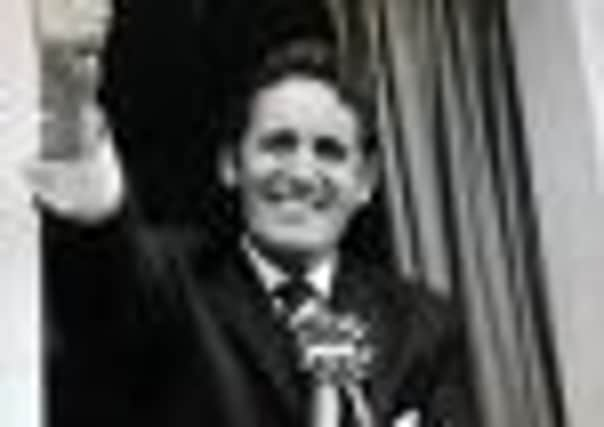Walter Harrison


It was his upbringing as one of what he used to describe as the “have nots” in life, coupled with his service overseas during the Second World War, that shaped his later life and values.
It was those values that saw him, as deputy chief whip, unwittingly play a critical role in James Callaghan’s Labour Government of 1979 losing a vote of no confidence, forcing a general election.
Advertisement
Hide AdAdvertisement
Hide AdHarrison wanted to enforce the convention and gentlemen’s agreement of ‘pairing’ in the House of Commons, under which if there was a sick MP in the Government an Opposition one would abstain to avoid a Government defeat.
He sought agreement from his opposite number, Bernard Weatherill, who rebuffed him saying it not been intended for such a critical vote and no Conservative MP would do so.
But Weatherill quickly changed his mind and offered to abstain, as he felt it would be dishonourable to break his word. Harrison was so impressed by Weatherill’s offer, which would have effectively ended his political career, that he released him from his obligation and the Government lost by one vote.
Harrison was a dependable deputy chief whip for 17 years, during which time he needed all his Yorkshire toughness and strong discipline to keep increasingly fractious backbenchers in order, especially in the late 1970s as the Labour Government wilted.
Advertisement
Hide AdAdvertisement
Hide AdHarrison was born and brought up in Daw Green, one of the toughest areas of Dewsbury, the eldest of 10 children of Henry and Ada Harrison. His father was an electrician who worked in the mines, but in 1932 the family moved to Castleford when he got a job with the Yorkshire Electrical Power Company.
Walter Harrison stayed behind, living with an aunt in Daw Green, so he could continue his education at Dewsbury Technical and Art College. To help support himself he also took on two daily paper rounds and looked after two allotments.
When he left school at 15 he followed his father into the power company until the outbreak of the Second World War saw him serve as a corporal in the RAF based in Iraq, the Middle East and Persian Gulf. The poverty he saw there stirred his social conscience so much that he knew he had to do something about it at home and subsequently became a political activist.
On demobilisation he worked for the civil engineering firm Richard Costain, at one stage doing the electrical work on the prefabricated homes which were quickly erected as a temporary solution to the post-war housing crisis, but lasted long after their intended life.
Advertisement
Hide AdAdvertisement
Hide AdHe was promoted to an inspector and foreman, then personnel officer. He was also Yorkshire president of the Electrical Trades Union.
His political career began when he was elected to Castleford Council in 1952, becoming deputy mayor in 1962. From 1958 he was also a West Riding county councillor. In the 1964 general election he was elected MP for Wakefield by a majority of 11,930.
Harold Wilson appointed him an assistant government whip under John Silkin, later making him responsible for ‘pairing’. In October 1968 he was made a Lord Commissioner of the Treasury.
When Labour lost the 1970 election, Harrison remained deputy to the then Chief Whip, Robert Mellish, using his iron discipline and Yorkshire tenacity in many a confrontation with both Government and his own backbenchers.
Advertisement
Hide AdAdvertisement
Hide AdAs a right-winger he was staunchly anti-Common Market, which led to a furious row with his equally determined pro-Marketeer and neighbouring Yorkshire MP, Roy Mason, for delivering a pro-Market speech in his Barnsley constituency.
When Labour returned to power in 1974, Harrison became deputy government chief whip and Treasurer of the Household, a post which saw him receive the occasional side of venison which he donated to old people’s homes in Wakefield. He preferred more traditional fare of roast beef and Yorkshire pudding.
When Callaghan succeeded Wilson, as a consolation for not being promoted to Chief Whip, Harrison was made a Privy Councillor in the 1977 Birthday Honours.
After Labour’s 1979 defeat Harrison stayed on as deputy chief whip. As pressure on Labour increased with a number of MPs defecting to the SDP, Harrison came under pressure in his constituency from the Left, but fought off an attempt to deselect him.
Advertisement
Hide AdAdvertisement
Hide AdWhen Conservatives slashed his majority to 360 at the 1983 election he stood down as a whip. He retired from the House in 1987, and in 2003 was granted the freedom of the City of Wakefield.
He always had a love of people and encouraged and instilled his values in his own family.
He was twice married, firstly in 1948 to Enid Coleman, who died in 1990, and secondly in 1991 to Jane Richards, who died in 2000. He is survived by his son Bob and daughter Pat from his first marriage.